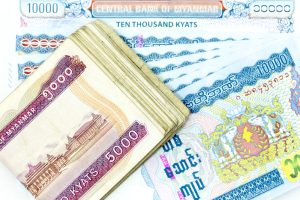The value of Myanmar’s kyat currency has fallen by nearly half since the military coup in February, providing the latest evidence of the extent of the country’s worsening economic crisis. Radio Free Asia reported on September 17 that the black market value of the kyat had fallen to an all-time low of 2,200 to the U.S. dollar, down from 1,330 on February 1, when the military overthrew Myanmar’s democratically elected government.
The depreciation is a direct result of the political turmoil prompted by the coup, which was followed by mass protests, civil disobedience work stoppages, violent crackdowns by the military junta, and disruption to critical services like telecommunications, banking, health, and education.
This hit an economy that was already stumbling due to the impact of lockdowns imposed to halt the COVID-19 pandemic, as well as the near-total collapse of certain sectors, like tourism, which relied on a flow of international visitors.
The direct cause of the slide, Nikkei Asia reported, was the Central Bank of Myanmar (CBM)’s decision to abolish a rule that kept the kyat-dollar exchange rate within 0.8 percent of the reference rate established by the CBM. In early August, the military administration directed the CBM to reintroduce the loose peg for the first time in three years, which the bank said was necessary to “keep the exchange rate stable and to keep commodity prices from rising.” But the bank later reversed course, scrapping the regulation on September 10 without explanation. The result was a sudden divergence between the black market rate and the central bank’s reference rate.
The devaluation has occurred despite the efforts of the CBM to inject U.S. dollars into the domestic market to shore up the kyat. According to a report in Myanmar Now, the CBM has released $120 million into the market since the coup, including a number of sales in July and August, but that these amounts have been insufficient to meet the growing demand for the global reserve currency.
In a broader sense, the plummeting value of the kyat reflects a widespread pessimism about the future of Myanmar’s economy, and an associated mass flight into the safety of the U.S. dollar. At the same time, the amount of U.S. currency circulating within Myanmar has flat-lined since the coup due to a collapse in exports and foreign direct investment, while U.S. sanctions have choked off the amount of U.S. dollars flowing into the country.
The falling value of the kyat is just one indication of the drastic economic contraction that has resulted from the combined impacts of the coup and the COVID-19 pandemic. In April, Fitch Solutions, a unit of Fitch Group, predicted that the economy would shrink by an astonishing 20 percent, from a pre-coup forecast of 2 percent growth.
The World Bank made a similar projection in its Myanmar Economic Monitor, published in late July, which suggested that Myanmar’s economy was on track to contract by 18 percent between October 2020 and September 2021. It estimated that a million jobs could be lost and the number of people living in poverty would likely more than double by the beginning of next year compared to 2019 levels.
The decline in value of Myanmar’s currency is set to push up the costs of imported goods, particularly petrol, contributing to the across-the-board increases in the cost of living. In addition to a weakening local currency, the World Bank’s Myanmar Economic Monitor suggested that the inflation will also significantly increase in the coming months, further increasing pressure on Myanmar households, and compounding the political challenges facing the junta.
The World Bank also pointed to another worrying trend, that as Myanmar’s “legitimate” economy implodes, the military will simply turn toward streams of revenue based on illicit or environmentally and social destructive activities like jade and timber extraction, and narcotics trafficking. “There are already early signs of increased dependence on extractive and/or illicit activities,” the World Bank said, “and a return to the inward-looking policies that have characterized much of Myanmar’s history.”
An earlier version of this article described Fitch Solutions as “an affiliate of the global rating agency Fitch Ratings.” In fact, Fitch Solutions and Fitch Ratings are both independently-run firms within Fitch Group.

































